Ever Googled something and asked how the results came to be? Why is Google showing a particular result from this website and not another? What’s the basis for a website ranking higher than another with the exact same topic? How can you make your website perform the same way?
The internet is now an integral part of business and advertising. Just the fact that there’s 80,959 Google searches happening per second (that’s almost 5 million searches in a minute), proves how people are now relying on search engines for information and how eCommerce is growing each year — try an estimate of 2.14 billion digital buyers by 2021. In the past, an agency or a business needed to have deep deep pockets to market their products and services in their area. Today, you can market your brand to the whole world without breaking the bank. Have your services accessible to people who are looking for them with just a click of the mouse, and the best part is that they can easily share your services with others who are interested in what you’re offering.
How do you appear right smack on the first page of search results and how do you stay on top? More importantly, how do you become visible to your target audience?
That’s where SEO comes in.
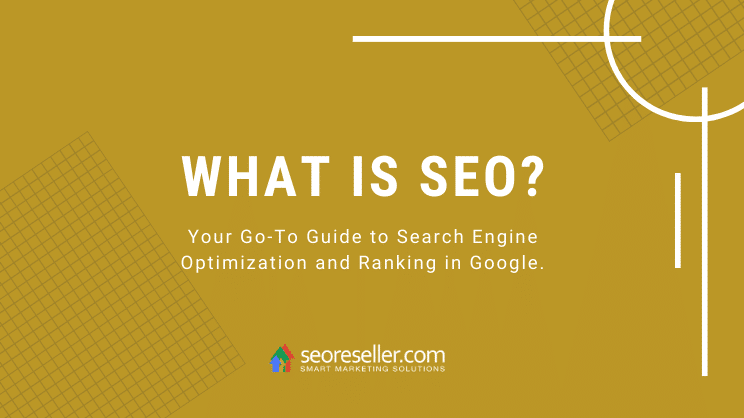
1. What is SEO?
SEO or Search Engine Optimization is the process of organically ranking in search engines through quality content resulting in increased website visits. Unlike paid ads (PPC), traffic that’s generated with SEO comes for free.
Beyond business, SEO is all about connecting people and search engines seamlessly.
Learning the fundamentals of search engine optimization is important whether you’re a beginner who wants to be an SEO expert, someone who wants to dominate search rankings, or people who are planning to start an SEO business.
SEO or Search Engine Optimization is the process of organically ranking in search engines through quality content resulting in increased website visits
2. The Beginning of SEO
Before we delve into specifics, let’s rewind and take a look at how SEO began. What was the first search engine? When was Google created? Where did SEO come from?
To understand SEO, you have to know when the first search engine came out. The first recorded search engine was released in 1990 in the name of Archie, which came from the word Archive. There were a lot of search engines that emerged before Google came out in 1996. Following the release of Archie, SEO was born. Many websites were launched in 1991 and the need to organize or categorize how information will be presented to searchers came to be.
In 1996, two engineers decided to create a search engine called BackRub, which ultimately became the biggest search engine in the world. BackRub – as it was called back then – is what we know now as Google.
With the increase in websites, many site owners began to practice manipulative techniques. This led Google to start working on algorithm updates that will have the ability to present the most relevant content to users. This evolved to what SEO is today, which enforces websites to raise the bar in sharpening their content and the quality of their UX and UI.
3. How does SEO work?
SEO isn’t a walk in the park. It isn’t magic either that happens overnight. But, SEO can deliver unimaginable results when done right. Unlike in PPC where you run ads based on how much you spend, SEO doesn’t require ad payments to appear on search engine results pages. SEO will continue to yield results as long as you update your site regularly and abide by quality guidelines. You can review Google’s Webmaster Guidelines to give you an idea of how you can get Google to understand and find your website pages.
What is a Search Engine?
A search engine is a user’s portal for accessing information on the web. Whether you’re using Google, Bing, or Yahoo, a search engine aims to deliver the best possible result matching a user’s query.
How do search engines rank results? How is a website ranked?
Search engines find websites that match a query through crawling and indexing. Crawling refers to the function of search engines ‘scanning’ your website and its pages. Indexing is the process of storing and organizing the content found during the crawling process. If you want to learn more about SEO terms and phrases refer to our SEO Jargon Buster.
Different search engines have different guidelines and ranking factors. They use different algorithms which is also the reason results may differ when you use Google or Bing. The common thing between these search engines is they update their algorithms constantly. This is how they provide quality and valuable information to users.
What is Optimization in SEO?
Your website needs to be optimized—meaning, it must go beyond merely being read by search engines and abiding by the algorithm they set. It should strategically provide value to your intended users through content.
4. Important SEO Terms to Know
SEO can get technical, so you need to know some of the terms associated with it. Let’s start with the following:
What is SEO writing?
SEO Writing or Search Engine Optimization writing is a type of writing technique that optimizes websites to become more searchable through search engines. It involves creatively using targeted keywords and long-tail phrases in a manner that not only makes them rank on search engines but also brings value to the user.
If you find that you can’t do the writing yourself, there are SEO writers and copywriters who understand search engine optimization and can apply them for written content.
So when should you hire content writers or copywriters? There are three aspects you have to consider: SEO know-how, writing skills, and time. You will most likely miss one of the three, whether you’re a website owner or you want to start an SEO agency. If that’s the case, hiring or outsourcing an SEO writer is the best option.
What is Technical SEO?
Technical SEO is the more tactical aspect of optimizing a website. It involves making sure that your website abides by the guidelines set by search engines, keyword research, site speed optimization, website architecture and more.
What is On-page SEO?
On-page SEO is the process of fixing and optimizing each page and the internal aspect of your website. This focuses on optimizing page titles, Meta Data, body text, images, videos, or any on-site content to improve the relevance of the website for target keywords.
If you want to check and analyze your website’s performance, try our free SEO audit tool.
What is Off-page SEO?
Off-page SEO is anything happening off-site or externally that involves your website’s ranking and search visibility. This is valuable because it helps promote your website in other places, which vouches for its credibility and highly contributes to a higher ranking in search engines.
One method that can get you this result is Link Building which is the method of promoting your website by constructing links on high-authority websites and directing them back to your site. This is another important factor of off-page SEO that will be a principal component for its success. It’s best to get a grasp of effective SEO link building strategies to know where to focus your efforts.
How do you differentiate SEO from SEM?
SEM or Search Engine Marketing is paid online advertising. It involves PPC or paid search. While SEO is mainly about organic results, SEM automatically delivers your website to users who searched for the keywords or phrases you specified. A paid ad is detected through the small ‘ad’ tag placed beside the URL on top of each listing.
They each have their strengths and weaknesses. For example, using SEM will automatically land your website on the first page of SERPS, however, this will only last as long as you’re willing to pay for the ad. Meanwhile, SEO is a more long-term option. Once you manage to rank, it will be harder for the competition to get an advantage over you. The flip side is that it does take time to see the results, but that makes SEO more valuable because not everyone will be able to do it.
What is White Hat SEO
White Hat means the ethical way and White Hat SEO means improving your search rankings on a search engine results page using ethical methods. White hat practices help in maintaining the integrity of your website and staying within the search engines’ terms and services. This is why you only work with providers who practice white hat strategies for their SEO services.
What is Black Hat SEO
The opposite of White Hat, Black Hat refers to implementing unethical methods to achieve a goal. Black Hat SEO is a disapproved practice that aims to increase a page’s ranking using manipulative methods or methods that don’t adhere to search engine guidelines.
Here’s the SEO Dictionary so you can explore more SEO terms.
5. What SEO Tools Should You Use?
Working with the right SEO tools is important to boost productivity. It will help you work faster, smarter and more accurately. There are hundreds of tools out there and more are being developed each day, but you’ll find that most of them are almost identical. We’re here to provide you with a few must-have SEO tools that will surely aid you in your journey.
1. Screaming Frog

Screaming Frog is a feature-rich SEO application that lets you crawl websites’ URLs and audit offline and online SEO. It also analyzes Meta descriptions and page titles to let you know if there are any discrepancies or duplicates on your website.
It also features Google Analytics integration, which allows you to access user data such as bounce rate, conversions, and revenue for landing pages.
2. Ahrefs
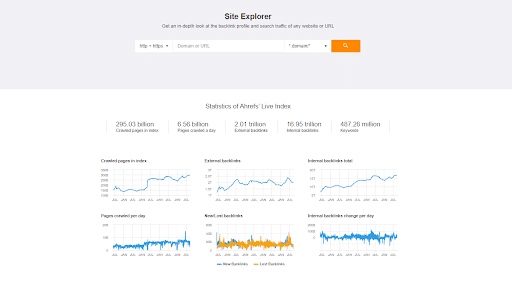
Your go-to tool for site auditing and backlink analysis. Ahrefs can do more than just diagnose and examine whether a website is SEO-ready to meet your traffic goals. They offer tools for competitive analysis, keyword research, backlink research, content research, daily rank tracking, and web monitoring. Their website crawling ability comes in second to Google. This allows for thorough and precise results, which makes this a favorite SEO tool for many.
3. SEMRush
If you don’t find Ahrefs to your liking then SEMRUSH might be a more suitable option for you. The software offers services from SEO dashboard, keyword analytics to marketing insights and social media tools, track your projects’ progress through their elegant and practical interface.
4. DeepCrawl
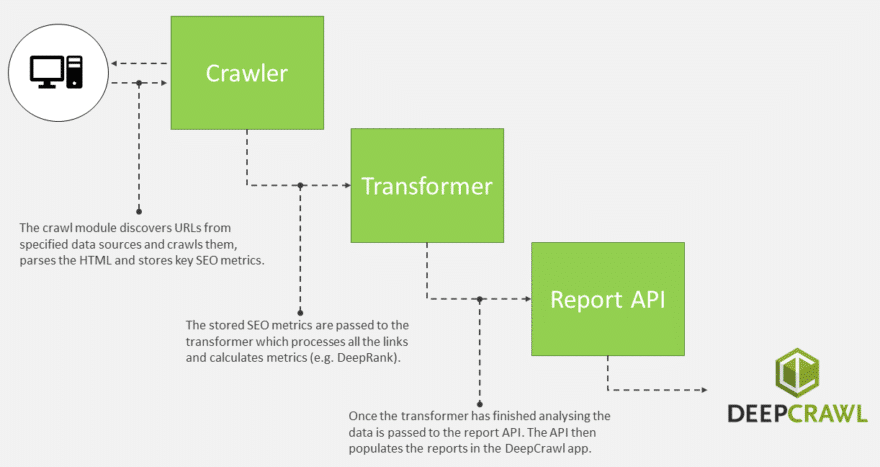
This is a web crawling tool that checks the performance of your website. Reports conducted by Deepcrawl include URL inspection, indexability, page uniqueness, bounce rates, page visits, time on page, load time and more. Unlike Screaming Frog where you conduct the crawling manually, you can schedule when you want your website to be crawled. This will be a great tool in helping you do technical SEO and on-page SEO.
5. Google Analytics
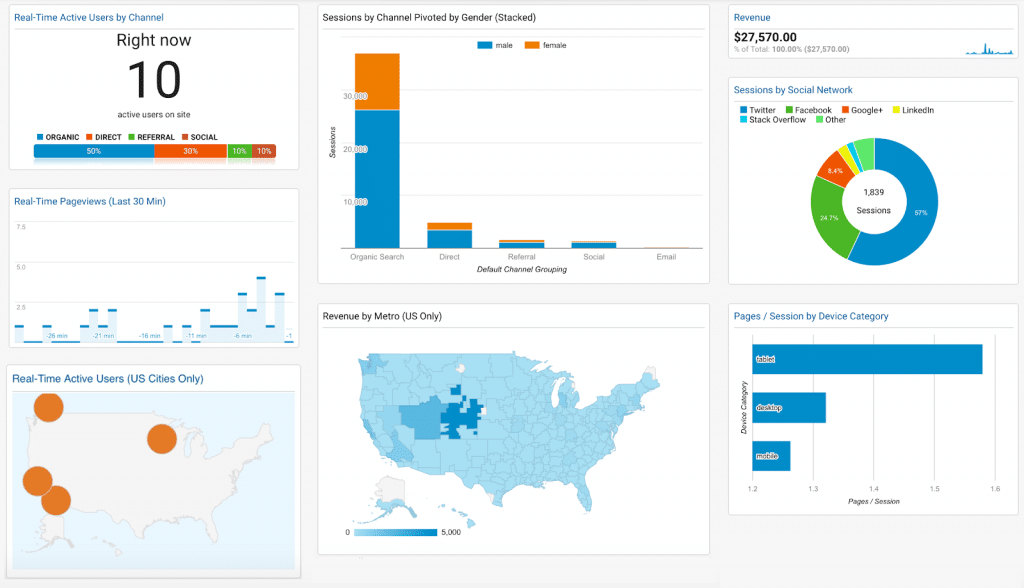
Google Analytics is a must-have tool for any SEO. This is your gateway to measuring your SEO ROI, analyzing channels and sources of traffic. It also provides user tracking ability to deliver information on bounce rate, session duration, and pages per session.
You can review online campaigns like tracking landing page quality and conversion by integrating Google Ads into the mix.
6. Google Search Console
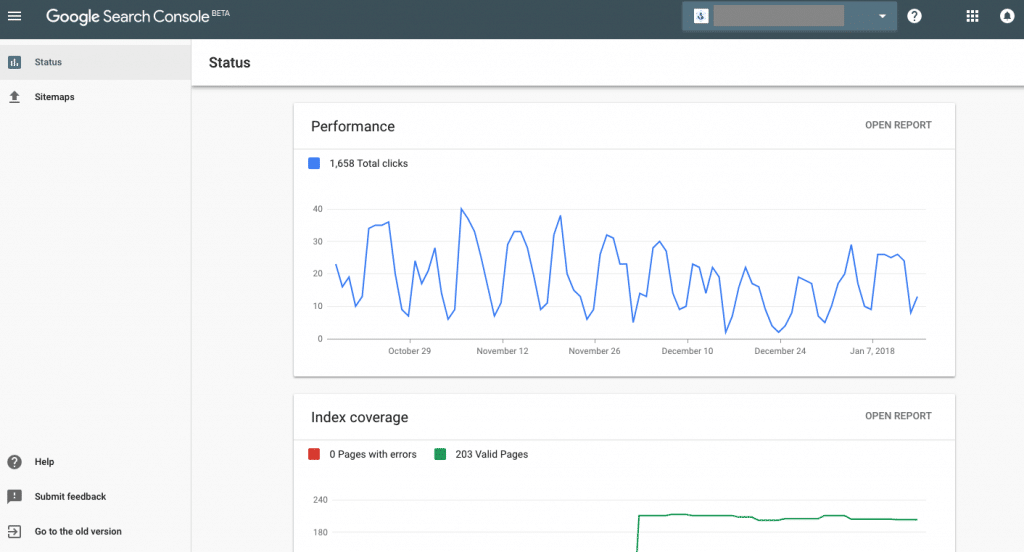
This is an easy-to-use and free all-around web service for web marketers, SEO professionals, webmasters, and web owners to monitor site performance. This tool is useful when you’re diving into data about search traffic, technical status updates and the overall health of a website.
7. Yoast
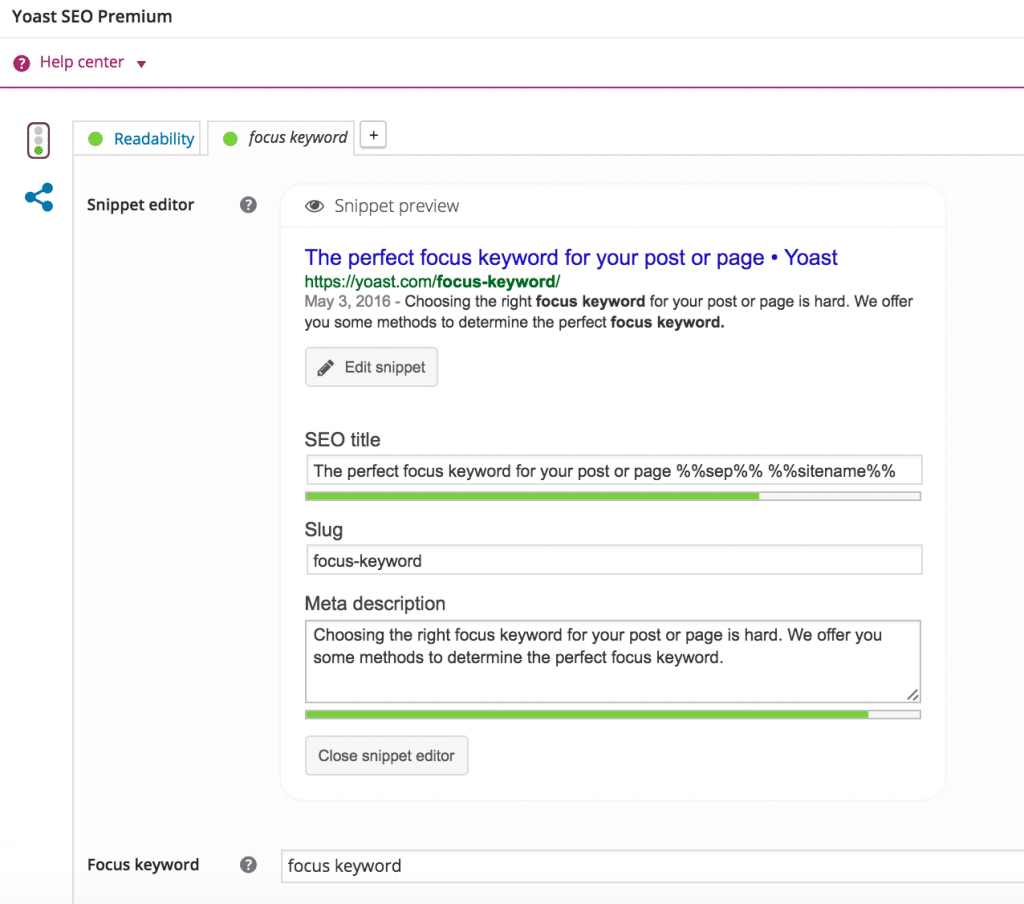
If you’ve been into SEO for some time now, you’ve probably been hearing this word everywhere. So what is Yoast? Yoast is one of the best – if not the best – WordPress plugin made for SEO. Yoast lets you automatically format Meta tags, as well as optimize sitemaps and content. It has everything a proper SEO tool should do.
6. Why Do Businesses Need SEO?
Businesses need SEO to increase online visibility, increase brand awareness, boost conversion rate, maximize sales and retain more clients. Imagine a situation where out of the blue, you have a party coming up and you need catering. You don’t know where to look so you head to Google. You type in what you need with your preferred location and all the available ones in your area pop up.
Most likely, you’ll click on the top 3 results, or maybe a featured snippet. You browse their menu, their packages, pricing and then look for reviews. You find the right one and follow the process for how you can get their services, whether it’s booking or setting a meeting. Finally, you have that off your to-do list and you can now go about completing other tasks.
A transaction happened for that business because its website landed on the first page of the search engine results pages (SERPS). This is because of SEO, because they optimized their business for search engines.
As long as people use the internet, SEO will continue to help deliver quality leads to your business by increasing your online presence and traffic. Of course, the process involves strategically designing your website and its content to exactly what your target audience needs so that search engines find it valuable enough to rank it.
Three Main Goals of SEO for Businesses:
1. Increase in Organic Traffic
‘How can I increase organic traffic’ is a common question for a lot of companies — and good reason. The more traffic, the more leads, the more business.
Now that customers are online, businesses want to land on the most coveted first page – even landing on a featured snippet if you’re being competitive. A featured snippet, also called position zero, is a result appearing at the top of a search page, often answering a question in relation to a search query. Only through organic search can a featured snippet be produced.
How valuable is this? You’re more likely to get three times more traffic than if you ranked second or third if you get to position zero.
SEO is a winning method in increasing your organic traffic. Knowing how to implement the right SEO technique will improve your site’s ranking.
2. Optimize Lead Generation and Acquisition
Every business’s goal is to acquire more leads. Treat your website as an elaborate online calling card that will readily appear whenever anyone searches for the service that you offer. You’ll see that you already possess the best lead generation tool; you just have to optimize it.
3. Maximizing ROI
One of the major reasons SEO has been growing in demand lately is its ability to maximize a business’ bottom line. This makes a lot of sense. The more visible your website is, the more people are going to click on it. And if your products or services are as good as you claim they are, more people are going to want them. This will lead to an increase in revenue and an overall great business performance.
SEO has evolved so much and continues to be an exciting topic. It will be a formidable part of your growing business once you learn to master it and utilize it correctly. Like Napoleon Hill said ‘Strength and growth come only through continuous effort and struggle’. Whether you want to start your own agency or you aim to grow your business, learning about SEO will be very beneficial for you and it’s worth pursuing if you want to reap long term benefits. If you want to learn more visit our Resource Center where you can get access to templates, methodology explainers, and other free materials.

